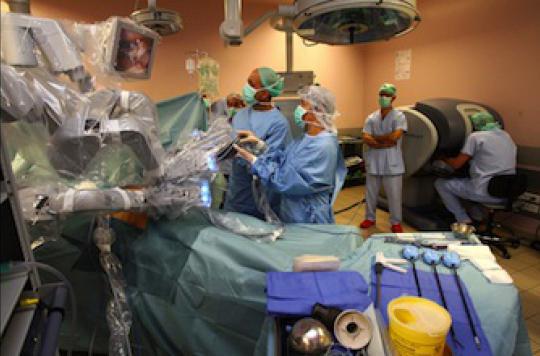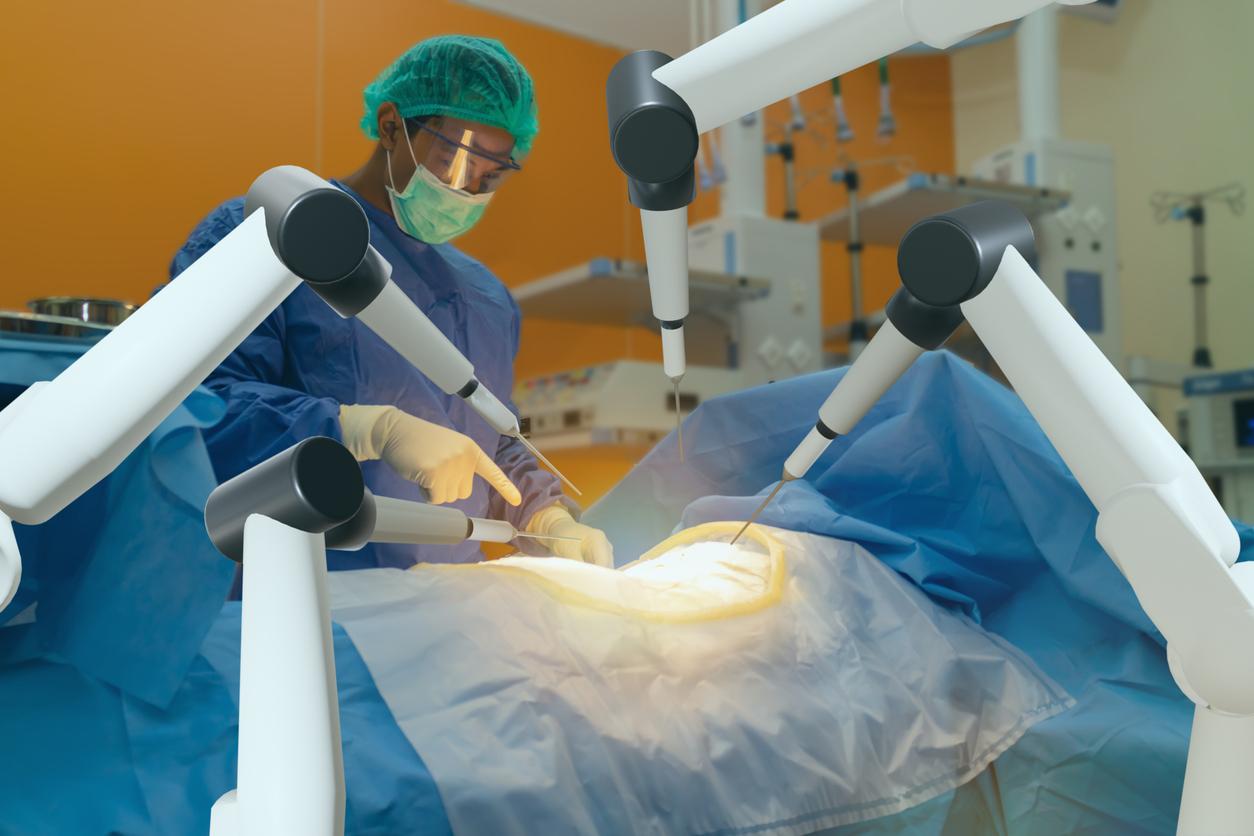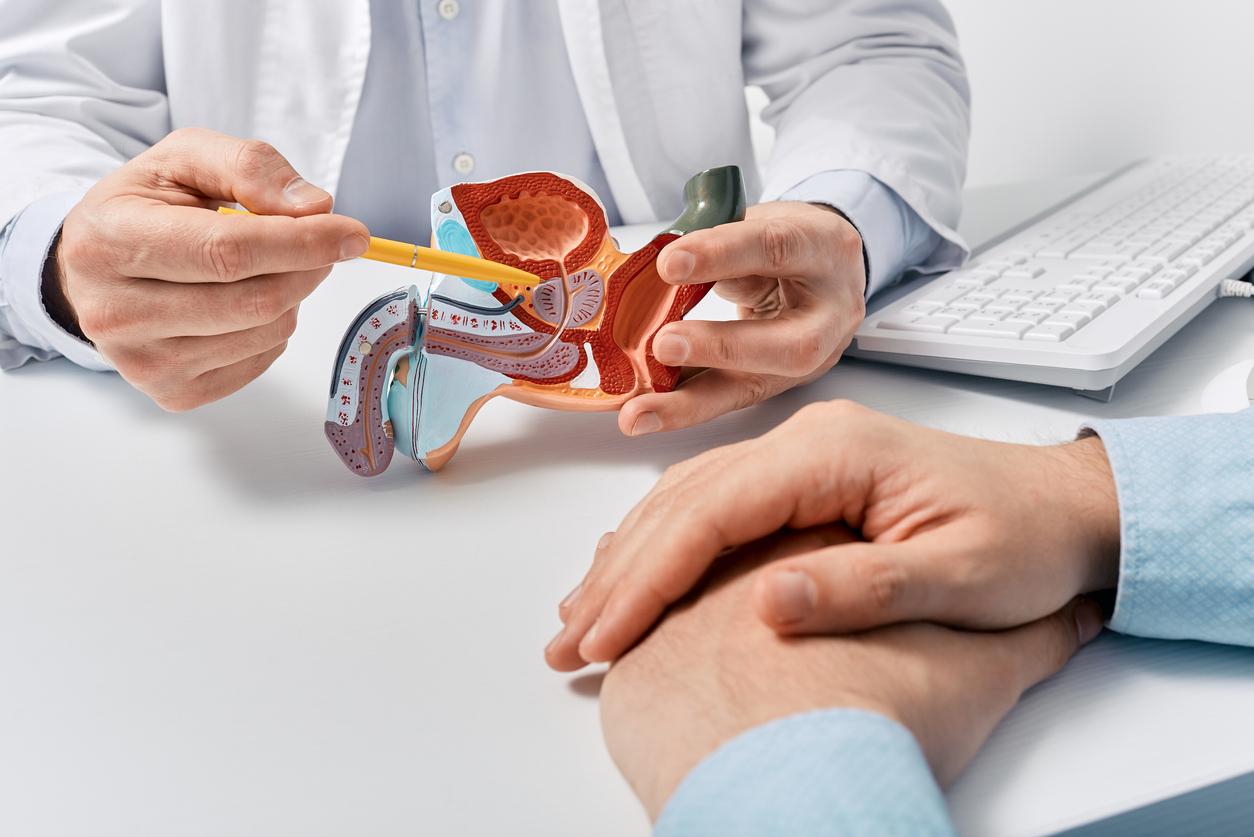Revolution or expensive gadget? Robotics in surgery arouses criticism from some practitioners. In the line of sight: too high a cost and few proven benefits for the patient.

Over the past ten years, robotics has been widely democratized within the operating theater. Initially reserved for surgical disciplines with fixed anatomical landmarks (neurosurgery, orthopedics), the use of robots quickly extended to visceral surgery, with the development of remote-controlled surgical intervention systems: the surgeon installed in front of at a console operates remotely, its eye riveted on a video screen. The patient is only in contact with the articulated arms of the robot, which manipulates the instruments, responding to the orders of the surgeon operator, via a sophisticated “joystick”.
But some practitioners are opposed to this trend towards the generalization of robots in surgery. In an intervention published in early 2013 by the French Federation of Visceral Surgery, Prof. Yves Panis, head of the colorectal surgery department at Beaujon Hospital, for his part believes that the use of robotics in this field is “a fashion, and not progress ”. Pr Michaël Peyromaure, head of the urology department at Cochin hospital, took offense in the pages of the World the unreasonable cost (between 1.5 million and 2 million euros) of a system that is ultimately not very beneficial for patients. The fad for patients and doctors, added to the monopoly on this sector of the company DaVinci® which manufactures the robot, are at the origin of these reactions.
More comfort for the surgeon
Currently, around sixty robots are at work in French hospitals. Their arrival in the operating room is the extension of an older innovation: laparoscopy or lapascopy. This “micro-invasive” surgery – in opposition to “open” surgery – consists of operating the patient through small orifices of about 10 millimeters, made on the abdominal wall using cameras and long instruments. .
This type of intervention requires specific training and great dexterity on the part of the surgeon. The arrival of the robot has therefore made it possible to facilitate the operative procedure, by allowing “technologically improved laparoscopy”. Whereas in traditional laparoscopic surgery, the surgeon must operate with the arms outstretched in one direction, the gaze in another, resting on a third axis; the robot-assisted operation allows him to be comfortably seated, with body, hands and eyes in the same axis.
“Laparoscopic prostatectomy is a difficult procedure in urology,” admits Professor Peyromaure. “On the contrary, the robot provides a certain ergonomics, allows us to see on a larger scale… It facilitated an operation which was quite difficult. This is why many people have switched from open prostatectomy to robotic assisted prostatectomy to avoid the difficult time of learning laparoscopy. “
Little benefit for the patient
The surgeon’s comfort is the only advantage that Professor Peyromaure recognizes in this technology. On the rest, his speech is much more critical. “Once the classic laparoscopic operation is mastered, there is no longer any need for a robot,” he says. To hear him, the benefits for the patient would ultimately be very slim. “Me, who masters classic laparoscopy very well, the results are quite similar,” he sighs. “There are a lot of urologists who are convinced that the robot gives better results, but all the published data are contradictory. It is a question of personal beliefs, and of school, but today, nothing says that the results are better with the robot. While what is certain is that the cost is multiplied by 10 or 20! “Inadmissible in times of crisis for Professor Peyromaure, who recommends pooling resources between services and hospitals. The Cochin hospital where he operates also shares a robot with the nearby Val-de-Grâce hospital to limit costs.
Listen to Professor Michaël Peyromaure, from the urology department of Cochin hospital: “We managed to make patients believe that the robot operated better than humans. And it became a major marketing argument.”
Pr Pascal Rischmann, head of the urology department at Toulouse University Hospital, is more on the side of the convinced. Its department acquired a robot in 2008, considering it to be a “factor of progress.” Among the advantages he lists: simplification of the operation, less bleeding, and a shorter hospital stay. But studies are lacking. “In medicine, the only studies that are worthwhile are randomized studies”, explains Professor Rischmann. “It is very easy to do for drugs, but you cannot draw lots for an operation performed by a surgeon, compared to another operation, another surgeon… it is at the limit of ethics. What we are comparing are patient cohorts. And at least one thing is clearly proven: the decrease in blood transfusions, “he says.
Listen to Prof. Pascal Rischmann, head of the Urology – Renal Transplantation – Andrology department, Toulouse University Hospital: “From the moment we talk about money, we are forced to talk about profitability. These are strong choices that have been made by the different teams. We believe that this is the direction of progress, and that it is worth the shot to put all that money. “
The surgeon’s experience, the only determining factor
If Prof. Rischmann does not want to insist too much on the advantages of robot-assisted laparoscopy, it is also for the sake of not falling into the “robot versus surgeon” controversy, he says. “If we start to say that it is much better, everyone will want to be treated by a robot, and patients who are operated in a conventional way will feel aggrieved,” he regrets. It is this type of drift that his Parisian colleague denounces with virulence. “It is very beneficial for the establishment, for the reputation … and if you do not have the robot, it is on the contrary difficult to maintain a reputation”, he regrets. Professor Peyromaure also fears “a commercial drift”, and the systematic use of prostatectomy in order to make the machine profitable.
Listen to Professor Michaël Peyromaure, from the urology department of Cochin hospital: “What I am denouncing is both a scam on the part of the company which markets the robot (…) and also an unethical use of the robot by certain teams.”
Despite their different uses of this technology, Professors Rischmann and Peyromaure agree on one point: what matters above all is the surgeon’s experience. Not the type of operation performed. “I know surgeons who continue to operate because they know how to do it very well and the people who are operated on by these surgeons are certainly very well treated”, assures Pr. Rischmann, who defends progress, while admitting that “The real revolution was laparoscopy, when we started making small holes instead of large incisions. “The robot” is more an evolution than a revolution. “
.

















